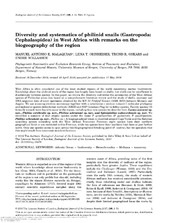Diversity and systematics of philinid snails (Gastropoda: Cephalaspidea) in West Africa with remarks on the biogeography of the region
Peer reviewed, Journal article
Published version

View/
Date
2016Metadata
Show full item recordCollections
Original version
https://doi.org/10.1111/zoj.12478Abstract
West Africa is often considered one of the least studied regions of the world concerning marine biodiversity. Knowledge about the philinid snails of the region has largely been based on shells, but shells can be insufficient to discriminate between species. In this paper, we review the diversity and revise the systematics of the West African species of Philinidae sensu lato based on a comprehensive literature review and the study of shells, anatomy and DNA sequence data of novel specimens obtained by the R/V Dr Fridtjof Nansen (2005–2012) between Morocco and Angola. We use scanning electron microscopy together with a cytochrome c oxidase subunit I molecular phylogeny and molecular species delimitation methods (ABGD and SDP Geneious Plug In) to define species. Twenty species (19 formally named) were found to occur in the region, including four new species we describe here: Laona nanseni sp. nov., Philine cerebralis sp. nov., Philine schrammi sp. nov. and Spiniphiline caboverdensis sp. nov. We identified a complex of four cryptic species under the name P. quadripartita (P. guineensis, P. quadripartita, Philine schrammi sp. nov., Philine sp.). A biogeographical break is observed around Cape Verde and the Sahelian upwelling system coinciding with the West African Transition Province; eight species have their northern geographical limit or are restricted to this Province, while ten species have their southern limit here or just further north. Only one species seems to span across this biogeographical breaking point (P. scabra), but we speculate that this might result from taxonomic misidentifications.
